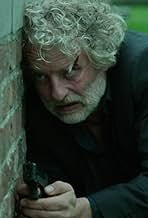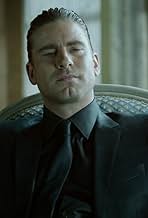Salamander
- Serie TV
- 2012–2018
- 40min
Aggiungi una trama nella tua linguaA police inspector investigates the robbery of 66 safe deposit boxes at a private bank in Brussels.A police inspector investigates the robbery of 66 safe deposit boxes at a private bank in Brussels.A police inspector investigates the robbery of 66 safe deposit boxes at a private bank in Brussels.
Sfoglia gli episodi
Recensioni in evidenza
Selected by BBC4 to replace the Saturday night spot traditionally taken by moody, brooding Nordic Noir series like "The Killing" and most recently "The Bridge", this Flemish cop-drama is very different in tone, but entertaining for all that.
I'm about three episodes in and while the plot lacks the darker undertones of its Scandinavian predecessors and there's far less character development too, both these aspects are commendable in my eyes in avoiding over-complexity in the plotting and the sometimes overdone quirkiness and personal problems of the main characters.
The central character interest is a transparently big, bluff everyday senior detective in the Belgian police, Paul Gerardi, who finds himself involved in sinister machinations when an underworld source tells him a major private bank has been broken into and yet has chosen not to report it to the police and indeed actively tries to cover up any sign of the break-in. Moreover, the robbery didn't involve money or bullion but rather the personal effects of some 66 highly connected individuals in Belgian society. Naturally, there's a malevolent, powerful network behind all this who will stop at nothing it appears to maintain the secret and who wish to silence Gerardi from bringing the matter to light.
Pacily filmed, more in daylight than the dark, I rather like the fact that it's more about the story than the characters' hang-ups although the latter may yet be invoked to pad out the next nine episodes but I'm hoping instead on a twisty-turny roller-coaster ride as Gerardi presumably avoids capture, finds out more about the mysterious "Salamander" group and their aims and the motives of the only scarcely glimpsed gang-leader behind the initial theft.
While I don't expect my insides turned outside-in, I am looking forward to enjoying the rest of this so far entertaining and involving production.
I'm about three episodes in and while the plot lacks the darker undertones of its Scandinavian predecessors and there's far less character development too, both these aspects are commendable in my eyes in avoiding over-complexity in the plotting and the sometimes overdone quirkiness and personal problems of the main characters.
The central character interest is a transparently big, bluff everyday senior detective in the Belgian police, Paul Gerardi, who finds himself involved in sinister machinations when an underworld source tells him a major private bank has been broken into and yet has chosen not to report it to the police and indeed actively tries to cover up any sign of the break-in. Moreover, the robbery didn't involve money or bullion but rather the personal effects of some 66 highly connected individuals in Belgian society. Naturally, there's a malevolent, powerful network behind all this who will stop at nothing it appears to maintain the secret and who wish to silence Gerardi from bringing the matter to light.
Pacily filmed, more in daylight than the dark, I rather like the fact that it's more about the story than the characters' hang-ups although the latter may yet be invoked to pad out the next nine episodes but I'm hoping instead on a twisty-turny roller-coaster ride as Gerardi presumably avoids capture, finds out more about the mysterious "Salamander" group and their aims and the motives of the only scarcely glimpsed gang-leader behind the initial theft.
While I don't expect my insides turned outside-in, I am looking forward to enjoying the rest of this so far entertaining and involving production.
Recent decade has seen so vast accrual of UK and Scandinavian crime thrillers, including political ones, that those coming from other European countries have often remained in the shadow. Being a fan of "modern" crimes series (i.e. without episode-based case settlements), I have tried to broaden my mind; thanks to Internet and IMDb, it is far easier than decades ago.
Based on some previous knowledge about Salamander, I was surprised at first as the first 1-2 episodes were rather slow and amply sentimental, although some events aside could create more robust and fixed approach. But then the characters and scenes became nicely fit for a crime thriller and the inclusion of past events made the storyline more versatile and with interesting twists. Both adversaries had their ups and downs and casualties, and even if you could guess some things happening next, there was still plenty of space for surprises. Beautiful urban and rural landscapes formed a nice background to otherwise nasty or sad events.
As for the performances, the males were more convincing and significant, particularly Filip Peeters as Paul Gerardi and Jo De Meyere as Armand Persigal; I have to admit that it was my first aware familiarisation with Belgian/Flemish actors. I will look forward to meet them again, eventually in another similar creation.
Based on some previous knowledge about Salamander, I was surprised at first as the first 1-2 episodes were rather slow and amply sentimental, although some events aside could create more robust and fixed approach. But then the characters and scenes became nicely fit for a crime thriller and the inclusion of past events made the storyline more versatile and with interesting twists. Both adversaries had their ups and downs and casualties, and even if you could guess some things happening next, there was still plenty of space for surprises. Beautiful urban and rural landscapes formed a nice background to otherwise nasty or sad events.
As for the performances, the males were more convincing and significant, particularly Filip Peeters as Paul Gerardi and Jo De Meyere as Armand Persigal; I have to admit that it was my first aware familiarisation with Belgian/Flemish actors. I will look forward to meet them again, eventually in another similar creation.
First, a synopsis, sine IMDb doesn't provide one: A private bank in Brussels has its locker room broken into, and the contents of some selected safes burgled, but only of their documents, not money. Turns out those safes belonged to prominent members of Belgian politics and society. The burglars use those documents to blackmail said prominent members. Enter Paul Gerardi, a Belgian police detective, who gets a whiff of the robbery and soon finds himself in over his head, as neither the robbers nor the victims care for a public police investigation.
The premise holds a lot of promise but the execution is by-the-numbers. People get killed for, in retrospect, no useful reason. A fair amount of investigative clues just conveniently fall into the detective's hands. The story doesn't make it seem as if he earned them. The main narrative arc of the first few episodes seems pointless, and could have been avoided had some of the main characters just talked to each other. The conclusion falls within the zone of predictability, and yet could only get there via a serendipitous series of developments in the final few episodes.
Having said all that, this is still a fairly watchable series. There are hit men to be avoided, car tails to be lost, criminals to be identified and caught, and the pacing is competent enough for a decent fortnight's romp.
The premise holds a lot of promise but the execution is by-the-numbers. People get killed for, in retrospect, no useful reason. A fair amount of investigative clues just conveniently fall into the detective's hands. The story doesn't make it seem as if he earned them. The main narrative arc of the first few episodes seems pointless, and could have been avoided had some of the main characters just talked to each other. The conclusion falls within the zone of predictability, and yet could only get there via a serendipitous series of developments in the final few episodes.
Having said all that, this is still a fairly watchable series. There are hit men to be avoided, car tails to be lost, criminals to be identified and caught, and the pacing is competent enough for a decent fortnight's romp.
Lately I've been watching and re-watching many films in my favorite exploitation sub-genre, the Italian Poliziotesschi or Eurocrime- thriller, and it's undoubtedly thanks to those films that I valorized and enjoyed my second viewing of "Salamander" on Belgian television even more than the first time. Apart from the different country setting and not featuring the guerrilla filming-style or overly excessive violence, "Salamander" basically is a Poliziotesschi stretched over 12 episodes. The story of one tough and unbreakable police detective single-handedly battling against an unknown but relentless criminal organization, but even more so against his superiors and the corrupt national legal & political system! Of course I realize this series isn't really modeled after gritty and sleazy Italian cop thrillers, but it was fun to see the same ideas and principles here in a much more polished and prominent (for Belgian standards) TV-format. Of all the great things about this series, the most praiseworthy aspect certainly is the script. The basic idea is already fantastic, but the further unfolding of the mystery, with all its crucial supportive characters and numerous convoluted twists, is so unbelievably compelling and intelligent that it's actually unseen on Belgian television.
Early one morning, well-organized and utterly disciplined men break into the vault of a bank and steal the content of 66 specific safety deposit boxes. The bank in question – Bank Jonckheere - is a private and very prestigious bank, however, and the safe-owners are all highly eminent and influential people (ministers, senators, magistrates, business tycoons, generals ) who use their deposit boxes to safeguard secretive documents like hidden financials, photos of orgies and sexual escapades, blackmail, political cover- ups and slush funds. Whoever owns all this stolen information has the power to destabilize and literally pull the plug out of the entire country, and that is clearly what he/she wants to achieve. Via Joachim Klaus, the top-criminal who organized the heist, the instructor gradually sends back copies of the safes' content to the rightful owners, and abrupt resignations, chaos in the parliament and even suicides immediately ensue. The heist was never reported to the police, for obvious reasons, and the concerned magistrates are holding off an investigation. Inspector Paul Gerardi nevertheless examines a tip from an informant and quickly ends up in a position that put his career, healthy and loved ones in great danger.
With all the scandals and corruption that occurred here in Belgium during the past 20-25 years, the script of "Salamander" becomes extra realistic and plausible. I'm convinced that every fellow Belgian who watched this series also thought at one point or another (and probably several times): "Surely this is really going on in those ivory towers in Brussels". The mystery around the bank heist is upheld very admirably and, in the end, all the little pieces of the large puzzle neatly fit together. "Salamander" contains a lot of action compared to traditional Belgian detective/krimi-series, and every episode features at least a few grisly murders, violent shootouts or wild chases. The acting performances are really high- level, with familiar and famous Belgian faces even in the smallest supportive roles. Everybody gives stellar performances, and several cast members even play their best roles in many years, like Jo De Meyere, Mike Verdrengh, Vic De Wachter and An Ceurvels. The second season will start airing on Belgian TV soon, early 2018, I think.
Early one morning, well-organized and utterly disciplined men break into the vault of a bank and steal the content of 66 specific safety deposit boxes. The bank in question – Bank Jonckheere - is a private and very prestigious bank, however, and the safe-owners are all highly eminent and influential people (ministers, senators, magistrates, business tycoons, generals ) who use their deposit boxes to safeguard secretive documents like hidden financials, photos of orgies and sexual escapades, blackmail, political cover- ups and slush funds. Whoever owns all this stolen information has the power to destabilize and literally pull the plug out of the entire country, and that is clearly what he/she wants to achieve. Via Joachim Klaus, the top-criminal who organized the heist, the instructor gradually sends back copies of the safes' content to the rightful owners, and abrupt resignations, chaos in the parliament and even suicides immediately ensue. The heist was never reported to the police, for obvious reasons, and the concerned magistrates are holding off an investigation. Inspector Paul Gerardi nevertheless examines a tip from an informant and quickly ends up in a position that put his career, healthy and loved ones in great danger.
With all the scandals and corruption that occurred here in Belgium during the past 20-25 years, the script of "Salamander" becomes extra realistic and plausible. I'm convinced that every fellow Belgian who watched this series also thought at one point or another (and probably several times): "Surely this is really going on in those ivory towers in Brussels". The mystery around the bank heist is upheld very admirably and, in the end, all the little pieces of the large puzzle neatly fit together. "Salamander" contains a lot of action compared to traditional Belgian detective/krimi-series, and every episode features at least a few grisly murders, violent shootouts or wild chases. The acting performances are really high- level, with familiar and famous Belgian faces even in the smallest supportive roles. Everybody gives stellar performances, and several cast members even play their best roles in many years, like Jo De Meyere, Mike Verdrengh, Vic De Wachter and An Ceurvels. The second season will start airing on Belgian TV soon, early 2018, I think.
After watching the first couple of episodes, I was completely hooked, the guy who plays the lead is a fantastic actor and the more you watch, the more involved in his life you become and instead of being the usual crime/whodunit mystery, it evolves into a personal mission for Geradi to find the truth. I love Belgium, and it is a great country, so the fact that this story has the backdrop of such a great location and history adds to its appeal. This mini-series seriously competes with other US addictive thriller rides, and yet has something more endearing and genuine at its heart. I loved it, and only wish they would do a second series with the lead character solving another new mystery.
Lo sapevi?
- QuizThe main actor Filip Peeters (Paul Gerardi) is married to An Miller (Gerardi's wife, Sarah Derycke in the series) in real life. They have two daughters.
- ConnessioniFeatured in The Wright Stuff: Episodio #19.30 (2014)
I più visti
Accedi per valutare e creare un elenco di titoli salvati per ottenere consigli personalizzati
- How many seasons does Salamander have?Powered by Alexa
Dettagli
- Data di uscita
- Paese di origine
- Siti ufficiali
- Lingue
- Celebre anche come
- Саламандра
- Luoghi delle riprese
- Aziende produttrici
- Vedi altri crediti dell’azienda su IMDbPro
Contribuisci a questa pagina
Suggerisci una modifica o aggiungi i contenuti mancanti

Divario superiore
By what name was Salamander (2012) officially released in India in English?
Rispondi





























